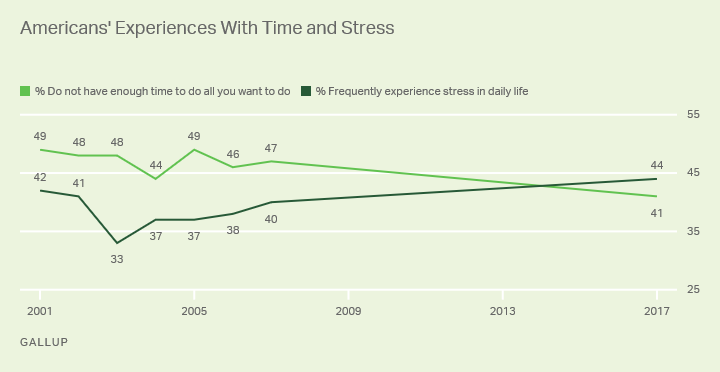Feeling stressed at work? You aren’t alone. According to a Gallup Poll, 79% of the American workforce reports feeling stressed about their job; nearly 50% say they need help managing the stress. Over time, these trends have worsened, with workers feeling like there’s more to do and less time to do it.

But what can be done to mitigate stress that stems from the workplace? BHS recommends the following:
“First, the type and amount of stress you experience is a direct result of your beliefs and attitudes,” says William Atkinson, author of Eliminate Stress From Your Life Forever. “People who experience less stress tend to understand that stress is a perception — a personal reaction to certain events — and they can control their reactions.”
Second, the amount of stress you experience is affected by your overall physical health, which you can improve by eating right, exercising regularly, getting enough sleep and doing exercises that relax you, such as meditation or deep breathing.
Mr. Atkinson offers these additional suggestions on dealing with stress before, during and after a stressful event.
Before stress
The following ideas can help stabilize your day-to-day experiences, which, in turn, can help minimize your reactions to stressful events.
- Find time for things in your life that make you happy. This can have a significant impact on the amount of stress you feel.
- Build social ties. People who have a strong social network of friends and family tend to experience less stress than those who feel alone.
- Simplify your life. Ask yourself if all the things you’re doing really need to be done.
- Redefine your TV habits. Ask yourself before you watch a show: “Is this show positive, upbeat and life-affirming?” If not, skip it and do something productive or relaxing.
In the moment
When you’re faced with a stressful situation, you can cope more effectively if you reflect on what you’re feeling, and smile or laugh, which will ease your tension.
“Laughter releases chemicals into the bloodstream that improve your alertness and mental functioning, thus allowing you to react better to challenging situations,” says Mr. Atkinson.
After stress
If you’ve experienced a particularly stressful event or day, these actions can help you decompress:
Exercise by yourself or with a friend or family member.
Read a book, watch a movie or listen to music.
Enjoy a hobby, such as gardening, woodworking, sewing or drawing.
Talk with a family member or friend about the things that are causing you stress.
Harvard Health Publishing recommends the following to reduce workplace stress:
- Relaxation strategies. Relaxation helps counter the physiological effects of the fight-or-flight response. For example, progressive muscle relaxation helps reduce muscle tension associated with anxiety. To practice this skill, sit comfortably with your eyes closed. Working from your legs upward, systematically tense and relax each major muscle groups. Hold the tension for 10 seconds; release tension for 20 seconds. Each time you release muscle tension, think “relax” to yourself. This skill and many other relaxation strategies can help reduce symptoms of anxiety.
- Problem-solving. Problem-solving is an active coping strategy that involves teaching people to take specific steps when approaching a roadblock or challenge. These steps include defining the problem, brainstorming potential solutions, ranking the solutions, developing an action plan, and testing the chosen solution.
- Mindfulness. Mindfulness is the ability to pay attention to the present moment with curiosity, openness, and acceptance. Stress can be exacerbated when we spend time ruminating about the past, worrying about the future, or engaging in self-criticism. Mindfulness helps to train the brain to break these harmful habits. You can cultivate mindfulness skills through formal practice (like guided meditation) and informal exercises (like mindful walking), or try mindfulness apps or classes. Mindfulness-based therapies are effective for reducing symptoms of depression and anxiety.
- Reappraising negative thoughts. Chronic stress and worry can lead people to develop a mental filter in which they automatically interpret situations through a negative lens. A person might jump to negative conclusions with little or no evidence (“my boss thinks I’m incompetent”) and doubt their ability to cope with stressors (“I’ll be devastated if I don’t get the promotion”). To reappraise negative thoughts, treat them as hypotheses instead of facts and consider other possibilities. Regularly practicing this skill can help people reduce negative emotions in response to stressors.

